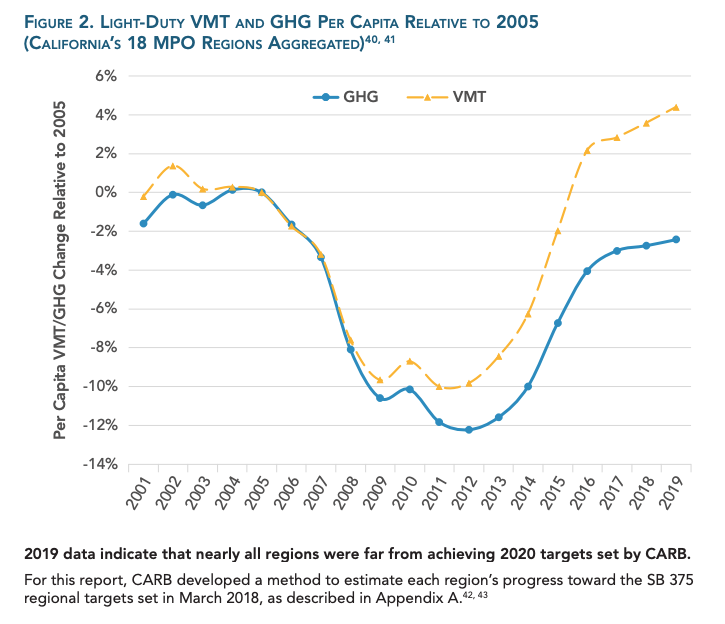You can’t tell if you’re winning or losing if you don’t keep score, especially when it comes to transportation greenhouse gas emissions.
But a close look at the data shows we’re not making much progress, and not making it fast enough, primarily because we’re driving more.
Your state highway department is likely to be in denial about these facts, and doing its best to hide them from the public.
California is ahead of most states in thinking hard about how to tackle climate change.
Bloviating about tactics, and simply repeating future goals is no substitute for frank reporting of current GHG levels; Is your state accurately reporting current transportation greenhouse gas emissions?
California: A model for tracking transportation greenhouse gases
The Air Resources Board is tracking how well California is doing in reducing transportation greenhouse gases per capita and driving since 2000.
For a time, it looked the state was doing pretty well. Between 2004 and 2012, California recorded significant declines in per capita driving (down about 10 percent from 2005 levels) and greenhouse gas emissions (down 12 percent). But in the last decade, both driving, and to a lesser extent, greenhouse gases have rebounded. Per person driving is now about 4 percent greater than it was in 2005, and, as a result, greenhouse gas emissions per capita are down barely 2 percent.
The Air Resources Board triangulates its estimates of annual levels of VMT and GHG using a combination of fuel sales data, vehicle registration data and detailed information on the fuel economy of all the light duty vehicles in California. It’s also noteworthy that these emissions estimates are compiled not by a road-building or transportation planning agency, but by the state’s air quality regulator.
The good news about the California figures are that they actually have a report that is tracking greenhouse gases and VMT—this report provides policy makers with a clear idea of how much progress the state is actually making toward its greenhouse gas reduction goals. California’s data underscores the important of vehicle miles traveled (GHGs are up when VMT is up, and down when VMT is down). California made great progress in reducing greenhouse gas emissions per capita for almost a decade, but since 2012, increasing travel has resulted in an emissions rebound (due to a collapse in fuel prices after 2013). The good news is that emissions are decoupling (slowly) from VMT, an indication that cars are becoming cleaner.
You can’t say if you’re winning or losing if you don’t keep score
Other places, who nominally claim to care about climate, aren’t even bothering to report these trends. As we’ve pointed out, the Portland Metro Regional Transportation Plan, which for a decade has set ambitious targets for reducing driving and greenhouse gases, simply failed to report any data about trends in greenhouse gas emissions (they went up, substantially, according to three separate inventories–none of which were mentioned in the Metro climate monitoring report.
There’s also the Oregon Department of Transportation, which also claims to have a climate strategy. But its progress report also leaves out date on VMT and greenhouse gas emission trends.
US DOT is insisting states track greenhouse gas emissions. It’s a pretty simple accounting requirement, and doesn’t have any real teeth, by highway agencies are bristling at the thought of having to do this. Some 22 states are actually suing USDOT to block the requirement and a Texas judge has ruled that the requirement exceeds DOT’s authority. Ultimately, you can’t know where you’re going, or whether you’re getting there, if you don’t actually measure your progress. But as a rule state DOTs simply don’t want to know—and they don’t want anyone else to know—that transportation is the leading source of greenhouse gas emissions, and that they’re doing little or nothing to take responsibility for the problem—much less solve it. You can’t see if you’re winning or losing if you don’t keep score, and for state DOT’s, if they don’t keep score, no one can prove they’re losing.

